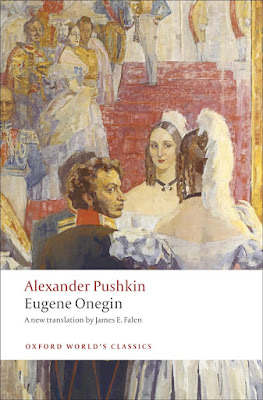Eugene Onegin
Alexander Pushkin is apparently a big thing
in Russia and even I have heard the name mentioned, though I have never read
anything from him before. As I understand it, he primarily wrote in verse and “Eugene
Onegin” is his attempt at writing a novel in that format.
The main character of “Eugene Onegin” is
the title character. Eugene is a dandy and a playboy who lives a dissipated
life. When he inherits an estate he gets into serious money, but also relocates
to the countryside. Here he meets a number of people. Lensky is a young poet,
he befriends. Olga is a pretty, airheaded girl whom Lensky intends to marry,
and Tatyana is Olga’s more bookish sister.
Tatyana is infatuated with Eugene, but when
she spills her heart to him, he gently, but firmly, rebuffs her. She is
severely shaken by that. Eugene is upset with Lensky for pressing him into
boring company and takes his revenge by showing excessive attention on Olga.
This upsets Lensky who challenges Eugene to a duel. Lensky looses, Olga quickly
marries someone else, and Eugene disappears.
Years later, Tatyana, seemingly gotten over
the affair, marries a general or prince or something like that and then meets
Eugene Onegin again. Now he realizes what he has lost, but that door is now
closed and there is no way he can get her back.
For a story written in verse, this is
reasonably tangible and accessible. It has an actual plot! Not perhaps the most
exciting plot, it does lean heavily into romantic clichés, but quite lucid
considering the format.
I have never entirely understood the idea
of poetry or fully appreciated it. Poetry seems suited to express small,
profound truths or emotions, such as haiku poetry, or intimate sensibilities,
such as streams of thought, but that also seems to be more modern use of the
format. Traditionally, the rhymes and strict rhythmic syntax are useful for
singing and proclamation, i.e. an oral presentation of the text and therefore
practical more than arty.
Pushkin seems to place himself in between
these positions. He wants to tell a story as a novel, but rather than using the
far more flexible standard prose form, he restricts himself to the rules of the
verse. It is difficult for me not to see this as an affectation. An ambition of
writing a Homerian story, suitable for declamation or to present the story in
the more elegant and charming format of verse.
Personally, I am not charmed by verse. It
looks restrictive and makes expressing the story far more challenging, but
maybe that is the point; to show he can do that. In which case it becomes a self-gratifying
project. Well, what do I know, I do not understand poetry.
I understand that for Russian speakers,
Pushkin’s work should be quite an experience, taking the language to another level.
I do not speak Russian and therefore read an English translation, so I am
simply impressed that the translator managed to find suitable rhymes and stick
to the format even in translation. That cannot have been easy. Unfortunately, I
am not getting any big revelation of use of language or what can be done in
verse. That part went over my head.
The book is surprisingly easy to get through.
The verse form at least has the advantage that the reading becomes rhythmic and
makes reading an almost automatic exercise. The lack of obscurity in the text
also made for an easy read and I am grateful for that.
This is not stuff that roams through my
mind for a long time. Rather, it was a book to get through and I happy it was
easy. Poetry buffs may have a different opinion, but that is their issue.

Ingen kommentarer:
Send en kommentar